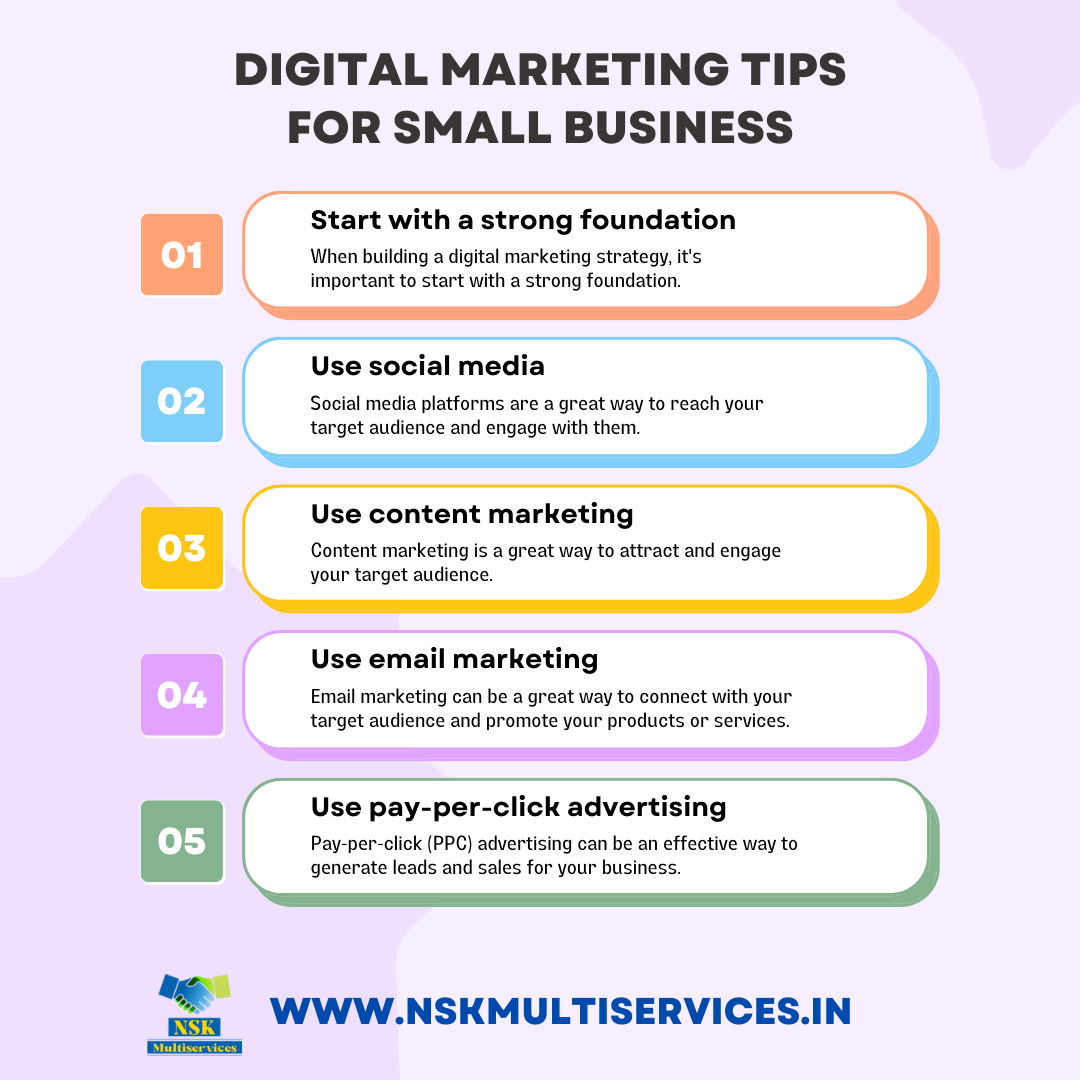Digital Marketing Services for Small Businesses
In today’s digital age, establishing a robust online presence has become nothing short of essential for the triumphant journey of small businesses. With the right digital marketing strategies and services at their disposal, small businesses can effectively reach their target audiences and hold their own in the fiercely competitive digital marketplace. In this comprehensive guide, we’ll delve deep into digital marketing services customized to cater to the unique needs of small businesses. Along the way, we’ll address ten frequently asked questions to offer clarity and insights.
1. Search Engine Optimization (SEO)
Search Engine Optimization (SEO) is the linchpin of digital marketing. It’s the process of optimizing your website and its content to ascend the ranks in search engine results pages (SERPs). Put simply, it’s your ticket to ensure that when potential customers scout for keywords related to your business, your website takes its deserving place at the pinnacle of the search results.
Read more about SEO : nskmultiservices.com
SEO is of paramount importance for small businesses because it facilitates:
- Augmented Visibility: When your website secures higher SERP rankings, you gain more visibility. This surge in visibility invariably leads to increased website traffic, more leads, and a boost in sales.
- Targeted Local Reach: SEO helps you zero in on local customers by optimizing your website for localized keywords. For instance, if you own a bakery in Nagpur, optimizing your website for keywords like “bakery near me” and “Nagpur bakery” ensures that your website makes an appearance at the zenith of SERPs when local denizens seek such keywords.
- Enhancement of Organic Traffic: Organic traffic, the kind that is derived from search engines rather than paid promotions, is exceptionally valuable. Optimizing your website for SEO boosts the influx of organic traffic to your site.
2. Social Media Marketing
Social media stands as a robust pillar in the digital marketing domain. It’s a powerful tool that enables small businesses to connect with their target audience, share content, deploy targeted ads, and cultivate a loyal following. Below, we break down the specific ways in which small businesses can harness the potential of social media to achieve their goals.
- Engagement with the Audience: Social media furnishes small businesses with an effective platform to engage with both existing and potential customers. It serves as a two-way street where businesses can answer questions, offer support, and share exclusive behind-the-scenes content.
- Content Dissemination: Sharing valuable content via social media, including blog posts, product announcements, and special promotions, is an excellent approach for small businesses to draw new followers and keep existing ones engaged.
- Targeted Advertising: Small businesses can utilize social media advertising platforms to zero in on specific demographics, interests, and geographical areas. This results in ads being exposed to individuals most likely to show interest in the products or services being offered.
- Building a Loyal Following: By maintaining consistent engagement with the audience and consistently delivering valuable content, small businesses can cultivate a loyal following on social media. This band of loyal followers can turn into a goldmine, providing a stream of leads, sales, and referrals.
3. Email Marketing
Email marketing forms an indispensable part of the digital marketing arsenal that small businesses can wield to nurture leads, retain customers, and drive conversions. This powerful tool enables small businesses to keep in touch with their audience, cultivate relationships, and drive them towards action. Here’s a more in-depth look at how small businesses can utilize email marketing to further their goals:
- Lead Nurturing: Email marketing serves as a valuable tool for nurturing leads. Through the delivery of educational content, such as blog posts, e-books, and webinars, small businesses can provide leads with insights into their offerings, thus encouraging them to delve deeper into the array of products and services.
- Customer Retention: In the realm of customer retention, email marketing emerges as a champion. It accomplishes this feat by consistently furnishing customers with updates about the business, such as new product launches, exclusive offers, and behind-the-scenes content. By keeping customers engaged, the chances of customer retention soar.
- Driving Conversions: One of the most potent uses of email marketing is driving conversions. Small businesses can entice subscribers to take action by sending targeted promotional offers. These can span discounts, coupons, or early access to new products or services.
4. Pay-Per-Click (PPC) Advertising
Small businesses have found their answer in Pay-Per-Click (PPC) advertising, an advertising mechanism offered by platforms like Google Ads and Facebook Ads. It allows businesses to zero in on specific demographics, keywords, and locations, ensuring their advertisements reach potential customers. The following are some distinct advantages of PPC advertising that small businesses can harness:
- Cost-effectiveness: PPC advertising emerges as an economical means for small businesses to reach their target audience. The billing is structured in a way that businesses only incur costs when individuals click on their advertisements, ensuring that resources aren’t squandered on ads that fail to captivate potential customers.
- Precision in Targeting: Small businesses can employ PPC advertising to specifically target their ads towards chosen demographics, keywords, and geographical areas. This precise targeting approach guarantees that the ads land in front of individuals who are likeliest to express interest in the offerings.
- Enhanced Measurability: Measuring the effectiveness of PPC advertising is a breeze. It allows tracking of key performance indicators such as ad visibility, click-through rates, and conversion rates. This data can be scrutinized and utilized to optimize advertising campaigns, thereby boosting results.
5. Content Marketing
Content marketing is a strategic approach wherein valuable, relevant, and consistent content is created and disseminated to capture and retain a clearly defined audience, all in pursuit of driving profitable customer action. It should be noted that content marketing doesn’t focus on the direct sale of products or services. Instead, it’s about fostering relationships with prospective and existing customers, offering information and resources that are genuinely helpful. When executed with finesse, content marketing can enable small businesses to:
- Increase Brand Awareness
- Generate Leads and Drive Sales
- Channel Traffic to Their Website
- Elevate Their Search Engine Ranking
- Build Trust and Credibility
- Establish Themselves as Thought Leaders in Their Industry
6. Website Development and Design
The website is the virtual storefront for any small business in the digital age. It plays the role of an online marketing hub and customer service center, making the creation of a well-designed website an absolute necessity. A professional website boasts the ability to:
- Attract New Customers: Your website is often the initial point of contact between your business and potential customers. A well-structured website can cast a favorable first impression and encourage visitors to delve further into your products or services.
- Generate Leads: Small businesses can deploy their website as a mechanism to gather leads from potential customers. This can be achieved through contact forms, email sign-ups, or other methods. Once a lead is secured, it can be nurtured through the sales funnel until the customer is primed for a purchase.
- Boost Sales: Websites can act as direct sales channels, enabling small businesses to sell products or services online. This is especially pivotal for e-commerce businesses, although brick-and-mortar businesses can also use their websites to amass sales leads and channel foot traffic to their physical locations.
- Enhance Customer Service: The website can also serve as a platform for offering customer support and answering frequently asked questions. This not only diminishes the workload on the customer service team but also enhances the overall customer experience. To maximize the benefits of a professional website, digital marketing services should be engaged to promote the website and connect it with the target audience.
7. Online Reputation Management (ORM)
Online reputation management (ORM) entails the process of monitoring and influencing the online presence of a business. It encompasses aspects such as the business website, social media pages, online reviews, and news articles. While ORM holds value for businesses across the board, it is particularly instrumental for small businesses. Here’s a glimpse of what an effective online reputation can bring to the table:
- Attraction of New Customers: Potential customers often gravitate towards companies that have cultivated a positive online reputation.
- Surge in Sales: A sterling online reputation can lead to an uptick in sales and profits, capitalizing on the increased trustworthiness.
- Establishment of Trust: A strong online reputation is synonymous with trust. Building trust with potential and existing customers is pivotal for small businesses.
- Enhancement of Customer Satisfaction: A favorable online reputation often coincides with improved customer satisfaction, serving as a win-win for all parties involved.
- Safeguarding the Brand: ORM acts as a shield that protects the brand from negative publicity and online attacks.
8. Local SEO (Local Search Optimization for Small Businesses)
When it comes to small businesses with a local customer base, optimizing for local search is paramount. This involves ensuring that your business appears prominently in search results when local residents search for keywords related to your business. There are various steps to bolster local SEO, including:
- Claim and Optimize Google My Business Listing: Your Google My Business listing is one of the most pivotal factors in dictating your local search ranking. It’s imperative to ensure that your listing is comprehensive and up-to-date. Incorporating relevant keywords into your business name, description, and categories further strengthens your local search performance.
- Creation of Location-specific Content: Small businesses can create blog posts, articles, and other content that cater to their local audience. This may encompass covering local events, news, or businesses. Including the city or town name in titles and throughout the content aids in local search optimization.
- Inclusion in Local Directories: Submitting business information to local directories such as Yelp, Yellow Pages, and the Chamber of Commerce boosts the visibility of your business across a wider spectrum of search results.
- Encouraging Customer Reviews: Customer reviews hold substantial weight in local search rankings. Encouraging customers to leave reviews on platforms like Google My Business listing and other online directories can enhance your standing in local search results.
9. Analytics and Data Analysis
Small businesses can unlock a world of opportunities through regular analysis of data stemming from website traffic, social media engagement, email open rates, and ad performance. The insights gathered can be instrumental in making informed decisions and assessing the return on investment (ROI). Here’s a more comprehensive look at the various ways in which small businesses can employ data analysis to enhance their operations:
- Website Traffic Analysis: Analyzing website traffic provides insights into visitor demographics, their origins, and the pages they frequent. These details can inform website design and content, as well as fine-tune marketing efforts.
- Social Media Engagement Analysis: By scrutinizing social media engagement, businesses can gauge how users interact with their brand. Valuable insights can be derived, revealing popular content and audience interests, which, in turn, can inform a revamped social media strategy.
- Email Open Rate Analysis: Email open rate analysis delivers a means to monitor how many recipients are opening emails. This information is pivotal in refining email content and subject lines, facilitating the distribution of more targeted emails to subscribers.
- Ad Performance Analysis: Ad performance analysis allows businesses to track ad effectiveness and pinpoint areas for improvement. Through a study of this data, ad campaigns can be fine-tuned to optimize return on investment.
10. Conversion Rate Optimization (CRO)
Conversion Rate Optimization (CRO) serves as the ultimate measure for any small business’s website. It focuses on improving the percentage of website visitors who take desired actions, such as making a purchase, completing a contact form, or subscribing to a newsletter. It’s an essential facet of any digital marketing strategy as it enables businesses to make the most of the incoming traffic. Various methods can be employed to enhance conversion rates, with some of the most popular and effective ones being:
- A/B Testing: A/B testing is a method used to compare two different versions of a web page to ascertain which one performs better. The test can be applied to different elements of a web page, including headlines, images, and call-to-actions.
- Heatmapping: Heatmapping is a tool used to track where visitors click on a web page. This helps in identifying underperforming areas and directing changes to improve click-through rates.
- Form Optimization: Form optimization focuses on enhancing the design and functionality of web forms to increase completion rates. Strategies include reducing the number of mandatory fields, streamlining the forms, and offering clear instructions.
- Personalization: Personalization tailors the user experience to individual visitors by using their past behavior to display relevant content and offers.
Related Articles
FAQs – Frequently Asked Questions
1. What is digital marketing, and why is it important for small businesses?
Digital marketing encompasses all online marketing efforts to promote products or services using digital channels such as websites, social media, email, search engines, and more. It’s essential for small businesses because it offers cost-effective ways to reach a broader audience and compete with larger competitors in the online marketplace.
2. What are the core digital marketing services for small businesses?
Core digital marketing services for small businesses include:1. Search Engine Optimization (SEO): To improve website visibility in search engine results.2. Social Media Marketing: To engage and interact with customers on social platforms.3. Email Marketing: For direct communication and customer retention.4. Pay-Per-Click (PPC) Advertising: To drive targeted traffic through paid ads.5. Content Marketing: Creating valuable content to attract and educate your audience.6. Website Development and Design: Ensuring a user-friendly and responsive website.7. Online Reputation Management (ORM): Monitoring and managing your online reputation.
3. How can SEO benefit my small business?
SEO helps your business by:1. Increasing organic (non-paid) website traffic.2. Improving search engine rankings.3. Enhancing online visibility and brand awareness.4. Attracting potential customers who are actively searching for your products or services.
4. Is social media marketing effective for small businesses with limited budgets?
Yes, social media marketing is cost-effective and highly beneficial for small businesses. You can reach a targeted audience, engage with customers, and promote your products or services without a significant upfront investment.
5. How does email marketing help in customer retention and nurturing leads?
Email marketing allows you to:1. Nurture leads with personalized content.2. Keep your audience informed about new products or promotions.3. Build long-term relationships and trust with customers.4. Encourage repeat business and referrals.
6. Can PPC advertising work for small businesses with limited resources?
Yes, PPC advertising can be tailored to fit small budgets. You only pay when someone clicks on your ad, making it a cost-effective way to drive targeted traffic and achieve specific marketing goals.
7. What types of content are essential for content marketing in small businesses?
Essential content types for small businesses include blog posts, articles, infographics, videos, podcasts, and social media updates. These content forms help educate and engage your audience.
8. Why is website development and design important for small businesses?
A well-designed and user-friendly website:1. Creates a positive first impression.2. Builds credibility and trust.3. Provides a platform for showcasing products or services.4. Enhances the overall customer experience.
9. How can small businesses manage and improve their online reputation?
Small businesses can manage and improve their online reputation by:1. Encouraging satisfied customers to leave positive reviews.2. Addressing negative reviews professionally and resolving customer issues.3. Monitoring online mentions and brand sentiment.4. Promoting positive press and testimonials.
10. How can small businesses measure the ROI of their digital marketing efforts?
Measuring the ROI of digital marketing involves tracking metrics such as website traffic, conversions, sales, email engagement, and ad performance. Small businesses can use tools like Google Analytics, email marketing software, and social media insights to assess the impact of their efforts.
Conclusion
The pivotal role of digital marketing services in the triumph of small businesses within the digital landscape cannot be understated. By harnessing the power of SEO, social media, email marketing, PPC advertising, content marketing, and other strategies, small businesses can effectively compete, build brand recognition, and establish connections with their target audience.
To attain success in the digital realm, small businesses should adopt a holistic digital marketing approach that aligns with their goals and budget. Regular analysis of performance metrics and the ongoing optimization of strategies ensure that their digital marketing endeavors yield a robust return on investment and contribute to long-term success.














